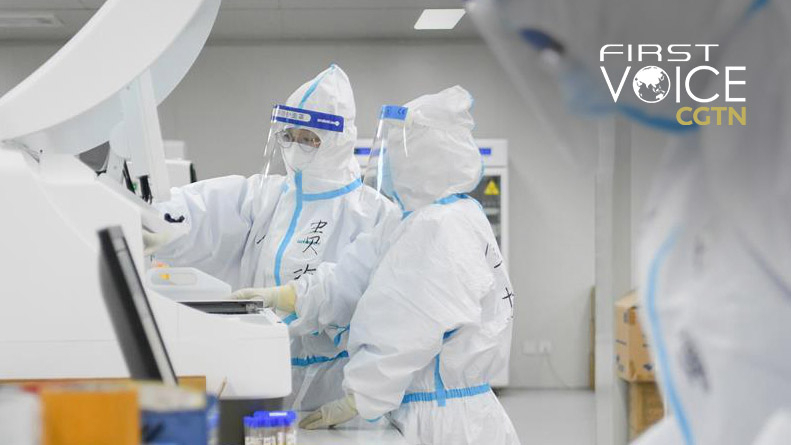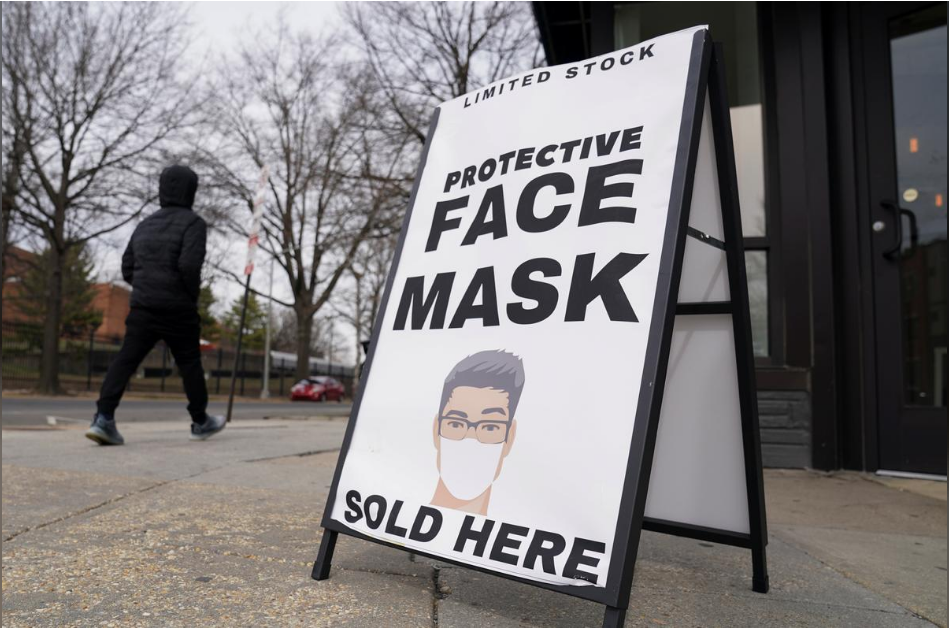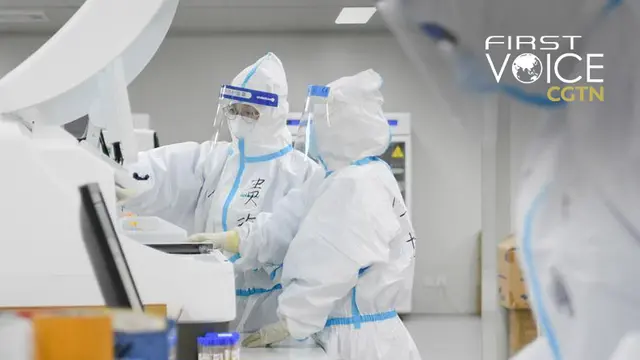
Editor's note : CGTN's First Voice provides instant commentary on breaking stories. The daily column clarifies emerging issues and better defines the news agenda, offering a Chinese perspective on the latest global events.
When answering a question from BBC on Sunday about why the country's testing ability has fallen short, UK Minister for Cabinet Office Michael Gove linked itto China not being clearabout the scale of the outbreak and the"nature andinfectiousness"of the disease.
However, anyone who's been following thesituation in the UK should be able to tell it is only a farfetched excuse thatseeks to deflect blame. This is a tactic used when the UK government itself has received serious criticism over its handling of COVID-19, which some would characterize as regrettably reactive.
For example, one month after an emergency was declared in China, when New York Times writer Ian Johnsonarrived in the Heathrow airport in London in late February, he was uneased by the fact thatthere was no temperature check orany health statement inplace. On March 13, Graham Medley, one of the government's expert scientific advisers,was still making jaw-dropping comments about allowing a large number of people to catch thevirus and generating "herd immunity." Only very recently, theUK government's response has witnessed a U-turn as it suddenly decided to close businesses and schools with Prime Minister Boris Johnson later telling people that they "must stay at home."
Pinning blame on China is clearly an attempt to shift attention away fromthegovernment'sown confusion and slowness in responding. But unfortunately, Gove is not alone in articulating such an idea andattemptingto lay the blame on China. As the COVID-19 crisis deepens in Europe and America, this kind of rhetoric has certainly gained moretractionwith some politicians.

A sign showing limited stock of protective face mask in Washington, U.S., March 5, 2020. /Reuters
For instance, in last week's G7 summit, U.S. Secretary of State Mike Pompeo went as far as saying the Communist Party of China "poses a substantial threat to our health andway of life." But a look at the current development of the situation in the U.S. and the administration's patchy response is self-explanatory as towhy he made this outlandish accusation. On Sunday, with the stark warning from advisers that200,000 Americans could die, President Trump backed away from his previous stance that businesses could reopen before Easter and extended social distancing guidelines for anothermonth, which is consistent with the confusing nature of the decision-making process in his administration with regards to the handling of COVID-19.
When these politicians criticize Chinafor causing the predicament in their own countries, their vision simply doesn't align with the reality. China sent experts to Wuhan to investigate the disease in Decemberand January and locked down the whole city on January 23. If the drastic actions taken there were not clear enough of an indication about the seriousness of the disease, the news thatkept coming out of China about the dire situation there since the lockdown certainly suffice to be solid proof. If they werelooking for more clues still, Chinanotified the WHO about the disease as early as December 31 and sharedthe virus' genomesequence on January 12, all of whichshould have bought theirgovernmentstime to study the disease and avoidbeing dragged into a similarposition as China.
When the blame game is played, theunderlying message is thatthe chaotic unfolding of events in countries outside China were only due to China's fault which the governments of these countries have absolutely no control over, andtherefore, in no way should they be held responsible. But they should be held accountable. They were given time to respond and shouldhave worked with scientists and medical professionals to nip such a crisisin the bud. Areference point is South Korea, which began developing and stockpiling test kits soon after China published the COVID-19 virus genome sequence, and when the situation worsened in the country, itwas able to test more than, 10,000 peoplea day.
Blaming China not only fails to justifysome governments' own slow actions but also, more dangerouslydistracts them from focusing on their ownissuesat hand. It also risks causingmorefractureswith Chinaat a time when international cooperation is most needed. During last week's G20, therehas been unprecedented solidarity in members as they vowed to combat the epidemic together. China has experiencedthe ferocious battle againstCOVID-19. It is able to offer valuable experiences in terms of what the disease is likeand effective treatment. With the situation turning better here, it is also more capable of sending other countries medical professionals as well as medical supplies. This should be a time for internationalcooperation instead of blame game and political theatre.
Script writer: Xu Sicong
(If you want to contribute and have specific expertise, please contact us at [email protected].)
 简体中文
简体中文

